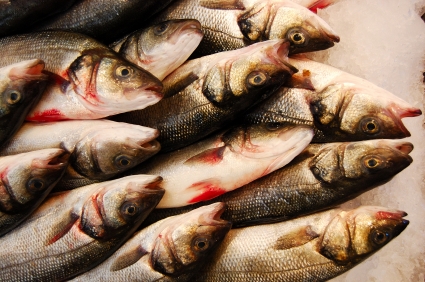“[Brown’s] ability to make a complicated subject accessible to the general reader is remarkable...” –Katherine Salant, Washington Post
The world fish catch is a measure of the productivity and health of the oceanic ecosystem that covers 70 percent of the earth's surface. The extent to which world demand for seafood is outrunning the sustainable yield of fisheries can be seen in shrinking fish stocks, declining catches, and collapsing fisheries.
Seafood plays a vital role in world food security. Roughly 3 billion people get about 20 percent of their animal protein from fishery products.
The world fish catch has hovered around 90 million tons over the last 20 years.
The wild fish catch per person has dropped dramatically, from 17 kilograms (37.5 pounds) per person at its height in 1988 to 13 kilograms in 2012—a 37-year low.
Over four fifths of the world’s fisheries are either considered fully exploited, with no room for safely increasing the catch, or they are already overfished and in need of rebuilding.
Small forage fish account for over half the supply of food fish in 36 countries, including the Maldives, the Philippines, and Ghana.
In 2012, world farmed fish production topped beef production for the first time in modern history.
China accounts for 60 percent of world farmed fish production.
Wild fish play a large role in the production of meat, milk, eggs, and farmed fish. Some 6 million tons of fishmeal and 1 million tons of fish oil are produced each year. Nearly all of the fishmeal is fed to farmed fish, pigs, and poultry; 74 percent of fish oil goes to fish farms.
Some aquacultural producers are scaling back. Between 1995 and 2007, the fishmeal content in shrimp feed dropped from 28 percent to 18 percent. The drop was even more dramatic for salmon, from 45 percent to 24 percent.
People will likely eat more fish from farms than from the wild in 2014, a historical milestone. As the world’s oceans are fished to their limits, any increase in world fish consumption will come from farms. Fish farming output is expected to increase 33 percent by 2021.
Well-managed marine reserves, where fishing is off-limits, help protect biodiversity and rebuild fish stocks. Fish catch and tourism revenue outside reserve boundaries often increase.
Data and additional resources available at www.earth-policy.org.
Research Contacts: J. Matthew Roney (202) 496-9290 x. 17 or jmroney (at) earth-policy.org
Janet Larsen (202) 496-9290 x. 14 or jlarsen (at) earth-policy.org
Updated March 2014


 Print:
Print:  Email
Email
